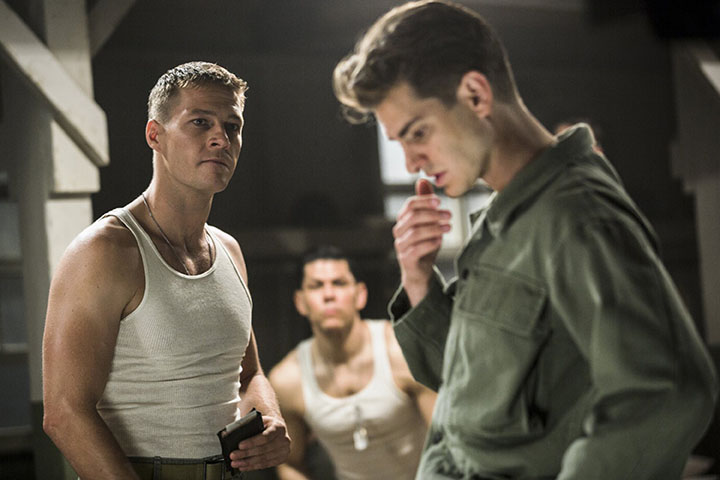Mel Gibson’s Hacksaw Ridge
Luke Bracey, left, in Hacksaw Ridge. (Mark Rogers/Cross Creek Pictures)
War films for the past decades in cinema have been characterized for their extreme penchant for patriotism and pride in one’s armed forces. In Mel Gibson’s Hacksaw Ridge, we finally have a film that not only still showcases the growth in fellowship between young and ambitious Marines, but most importantly demonstrates the grim upset of war on body and soul.
For so long we’ve had these kinds of tales that end with nothing but bloodshed and mayhem. Now, we have ourselves a true story of one man’s courage to resist murder at a time of mass carnage, and should change the way we look at the difference between necessary violence and living up to one’s pacifistic beliefs and the power that one person can have in uplifting the visceral terror (I mean that literally) of wartime.
Andrew Garfield very fittingly depicts with that great brush of boyish innocence the centerpiece hero that is Desmond Doss, a Christian younger from Lynchburg, Virginia, and the notorious savior of dozens of American troops while refusing to ever fire a shot.
Miracles such as this are truly hard to come by. What Gibson does so much better with this one than he does with previous successful efforts is laying out who Desmond is, his relationship to his family, in particular his veteran father Thomas Doss (a wonderful Hugo Weaving), and the steep bond with Desmond and his more combatant minded brothers in arms.
When I say this film is very well made, I mean it with every bone. We are given Desmond’s backstory to illuminate firsthand the perfect American life he leads before joining the army, but amongst every angelic part of life is a flaw.
That flaw is the unfortunate emotional decline of Desmond’s father. Tom Doss is a man who has seen it all and bears the painful reminders of the loss of his own men in the past. This begins the pitting of Desmond’s pacifistic values against the will to bear arms in a foreign country and defend till death do both sides part.
It becomes interesting from here on when the deeply troubled Tom begins to have faith in his son, and that he realizes the bright shining light in Desmond’s soul is like a beacon of hope, therefore defending every right his son has with regards to his well-intentioned beliefs in nonviolence, even as the state military deny his acceptance to serve.
Desmond eventually breaks the barrier of nonviolence to fall in with his fellow troops on Okinawa at the infamous hell that is Hacksaw Ridge, where many, both Japanese and Americans suffered the worst at such a gruesome time in history.
Gibson captures it all, and unlike previous efforts, he shows more precision in the action and violence that doesn’t linger in long stretches of gory imagery but instead progresses with crisp clarity in editing and direction, showing the frenetic terror of it all without sacrificing time for shock value.
And believe me, the shock value does register when calling for suspense in this opera of human horror. 85/100. Released November 4th. 139 minutes, rated R.


